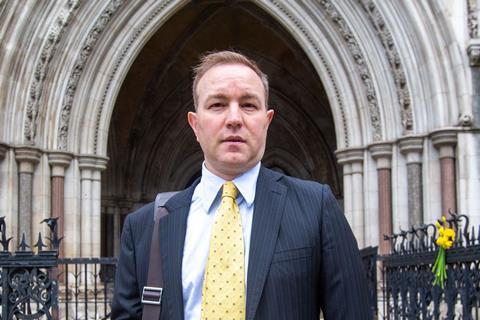The judge's ‘misdirections’ to a jury in a trial over interest-rate rigging led to the jury not considering ‘the actual case’, the Court of Appeal was told yesterday.
Sitting at the Royal Courts of Justice, Lord Justice Bean, Lord Justice Popplewell and Mr Justice Bryan heard submissions from Adrian Darbishire KC, for Tom Hayes, on the first day of the three-day hearing.
The case of Hayes and Carlo Palombo was referred to the Court of Appeal by the Criminal Case Review Commission which found there was a ‘real possibility’ the court would follow the approach taken by the US Court in Connolly and Black and overturn the convictions.
The two grounds of Hayes’s appeal focus on the trial judge’s direction to the jury.
Hayes argues the trial judge was wrong in law to direct the jury that there was an absolute legal prohibition on commercial considerations in setting the London Inter-Bank Offered Rate (LIBOR), though ‘no such prohibition in law existed'.
The second ground argued the judge was wrong to direct the jury that, as a result of the legal prohibition on commercial considerations, if Hayes agreed to submissions which were intended to advantage his trading, then the remaining issue to deal with was dishonesty. Darbishire told the court that the jury should have been directed to deal with the factual questions including that Hayes had agreed to disregard the proper basis for LIBOR rate submissions before the issue of dishonesty.

Darbishire said: ‘Whether [Hayes] has or has not [given a genuine answer] is a question of fact not law.'
Discussing the judge’s summing up in Hayes’ trial, Darbishire said: ‘These are not explanations to the jury, they are binding directions in law. The indictment agreement was [if] Hayes agreed to break the rules and make the statements made. Whether he did that or not was a question for the jury. He denied doing that. He did not agree he thought that was disregarding the proper basis of LIBOR. He did not accept he agreed to make false statements.
‘The judge for all practical purposes directed the jury that what Mr Hayes agreed to do was obviously dishonest. [Hayes’] actual case was never entertained by a jury.’
In documents referred to in court, Darbishire, who described the judge’s directions as ‘misdirections’, said ‘nowhere did the [Serious Fraud Office] suggest that there was a law which prohibited consideration of commercial factors’. Darbishire added: ‘The approach in Connolly is the only approach consistent with English principles.’
Tim Owen KC, for Palombo, began his submissions in the last hour of the first day. He said the US judges in Connolly and Black had ‘98 years’ experience sitting on the second circuit Court of Appeal’. He told the court the outcome of Connolly and Black was ‘that you cannot have a case to answer on this case’. He added: ‘We are the only country in the world that criminalises this.’


























